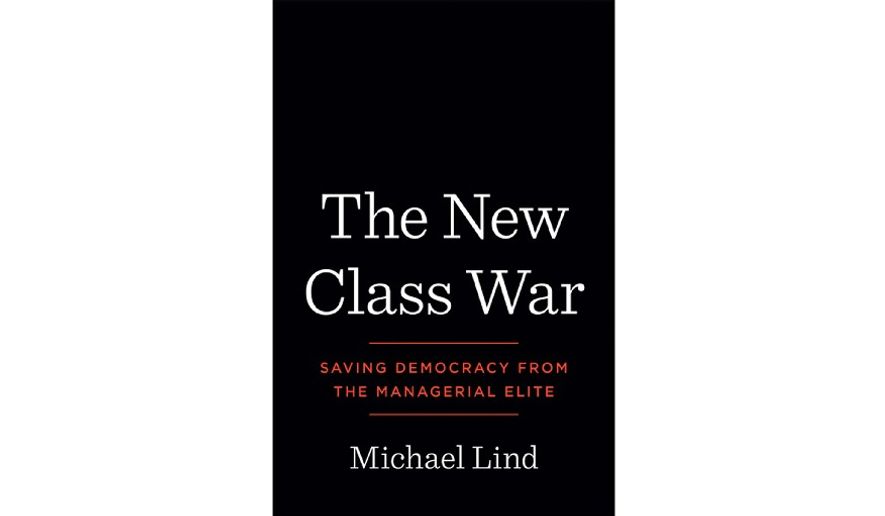OPINION:
In what well may be an understatement, Professor Sean Wilentz characterizes Michael Lind as “One of those wonderfully unpredictable writers who does not allow his allegiances to overrule his ideas.”
In his late 20s, armed with degrees from the University of Texas and Yale, Mr. Lind landed every young conservative’s dream job — research assistant to William F. Buckley Jr., a job that entailed helping with the latest book (in 1990 the book was “Gratitude”), speeches, correspondence, articles, mail, as well as traveling and dining with Bill Buckley, sailing on his yacht, hobnobbing with his colleagues, family and friends. He also served as a fellow at The Heritage Foundation and was named editor of The National Interest.
However, apparently a highly emotional young man as well as a thoughtful one, in the mid-1990s he took great umbrage at the direction he perceived conservatism to be taking and turned his considerable talents to waging war against it.
He broke with Buckley, turned his guns on conservatives like Newt Gingrich, Pat Buchanan and on Pat Robertson’s Christian Coalition, wrote articles like “The Death of Intellectual Conservatism,” and published a book titled “Up From Conservatism,” (a takeoff on Buckley’s “Up From Liberalism.” Buckley’s only recorded comment came in a column: “Michael Lind is a talented young writer whose general distress over Pat Robertson’s Christian Coalition has caused him to do everything to repudiate his past except change his name.”)
Needless to say, his apostasy delighted the liberal literary world (much more powerful then than now), and he became an editor at Harper’s, then The New Republic, then the New Yorker, each appointment lasting for a year, presumably ending when they understood that what he was talking about wasn’t what they thought it was and realized he wasn’t one of them at all. So what was he? As it turns out, he might be called a Texan, albeit an intellectually inclined one, and therefore undefinable.
Mr. Lind has since returned to his native Texas, where his family has well-established and respected roots, and where, although he retains ties with something harmless called New America, he breathes Texas air, works as a professor of practice at the Lyndon B. Johnson School of Public Affairs at the University of Texas at Austin, has mended some fences on the right, and writes complex but clearheaded articles and books like this one.
In “The New Class War,” inspired in part by James Burnham’s now classic “The Managerial Revolution”(1941), Mr. Lind takes up the current unrest sweeping the world — he calls it “native working-class populism” — whether here, England, France, Germany, in each case with immediately identifiable “issues” of concern — immigration, sovereignty fuel prices.
But these issues are symptoms, he writes, and the real issue is power. “Social power exists in three realms — government, the economy, and the culture [and] all three realms of Western society today are fronts in the new class war.”
The first class war began with industrialization and the emergence of industrial workers and bourgeois capitalists, “later joined by university-credentialed managers. Reforms were partial and limited, until the imperative of mobilizing entire national populations for war made ending class conflict a necessity.”
This led to a period of “democratic pluralism” with all classes equally represented in the “three realms” of power, lasting through the 1950s, during which “the societies of the North Atlantic enjoyed mass prosperity and reduced inequality.”
However, beginning in the 1960s, there has been a “revolution from above that has promoted the material interests and intangible values of the college-educated minority of managers and professionals, who have succeeded old-fashioned bourgeois capitalists as the dominant elite.”
“What has replaced democratic pluralism can be described as technocratic neoliberalism.” And in turn, this “technocratic neo-liberal revolution from above has provoked a populist backlash from below by the defensive and disempowered working class,” who are increasingly finding spokesmen in figures like Donald Trump, Marine Le Pen, Boris Johnson.
But in the end, Mr. Lind writes, achieving genuine class peace will require returning “decision-making power to the non-university-majority in all three realms of social power — the economy, politics, and culture.”
Mr. Lind sums it all up in this way: “Demagogic populism is a symptom. Technocratic neoliberalism is the disease. Democratic pluralism is the cure.”
QED.
• John R. Coyne Jr., a former White House speechwriter, is co-author of “Strictly Right: William F. Buckley Jr. and the American Conservative Movement” (Wiley).
• • •
THE NEW CLASS WAR: SAVING DEMOCRACY FROM THE MANAGERIAL ELITE
By Michael Lind
Portfolio/Penguin, $25, 203 pages




Please read our comment policy before commenting.